|
The Texas A&M University architecture program’s longstanding
relationship with the Dallas, Texas-based international architecture
firm, HKS Inc., began with the firm’s 1939 founding by
Harwood K. Smith, FAIA, a member of Texas A&M’s Class
of 1936 and life-long supporter of Texas A&M architecture.
Since 1971, the firm has served the Texas A&M College of
Architecture in an advisory/teaching capacity, providing professional
guidance in studio collaborations on myriad projects, especially
within the area of health facilities design.
Three current HKS leaders, themselves graduates of the Texas
A&M architecture program, share the late Harwood Smith’s
commitment to advancing architectural education at their alma
mater. These HKS officials, Ron Skaggs ’65, Joseph Sprague ’70,
and Craig Beale ’71, have demonstrated their personal commitment
to Texas A&M architecture by endowing three faculty positions
focusing on healthcare architecture.
The endowments were established
to elevate and further coordinate innovation, teaching, research
and practice efforts, as they
relate to improving the unique and internationally recognized
architecture-for-health initiatives at Texas A&M University.
The positions — one chair and two professorships, now
all fully funded — received faculty appointments in October
2006 from J. Thomas Regan, dean of the College of Architecture:
•
George J. Mann, professor of architecture, was appointed as the
Ronald L. Skaggs, FAIA and Joseph G. Sprague, FAIA Endowed Chair
in Health Facilities Design;
•
Roger Ulrich, professor of architecture, is holder of the Julie
and Craig Beale ’71 Endowed Professorship in Health Facilities
Design; and
• Susan Rodiek, professor of architecture and associate director
of Texas A&M’s Center for Health Systems & Design,
is holder of the Ronald L. Skaggs Endowed Professorship in Health
Facilities Design, a position originally held by Mann.
About the donors
The donors behind these three unique endowed faculty positions
are regular participants in the HKS studio collaborations with
Texas A&M students. Recent collaborations have included
a 269,000-square-foot medical center for Mansfield, Texas and
the 1.2 million-square-foot Hatfield Hospital serving the London
suburbs of Bedfordshire and Hertfordshire.
Ronald L. Skaggs, FAIA, FACHA, FHFI, is chairman of HKS, Inc.
He directs the overall activities of the firm and serves as principal-in-charge
of various healthcare projects. He has been with HKS for 39 years
and is the founder of the HKS Healthcare Practice. He is currently
a member of the American Architectural Foundation Board of Regents
and on the board of the National Institute of Building Sciences.
In 2000, he served as president of the American Institute of
Architects. He is a fellow of the Health Facility Institute,
a member of the American Hospital Association and past president
of the Forum for Health Care Planning. He is also a trustee of
the Texas Scottish Rite Hospital for Children, served on the
advisory board of the Construction Industry Presidents Forum,
and is past chairman of the Development Council of the College
of Architecture at Texas A&M University. Skaggs also holds
a position as adjunct professor of architecture at Texas A&M
University.
Joseph G. Sprague, FAIA, FACHA, FHFI, HKS principal and senior
vice president, is director of HKS Health Facilities. He has
more than 35 years experience designing hospitals and healthcare
facilities. He was director of the Division of Design and Construction
of the American Hospital Association in Chicago for 10 years.
At HKS, Inc. he serves as technical advisor and health facilities
principal. Most recently, Sprague was elected to the 2006 Board
of Regents for the American College of Healthcare Architects
(ACHA). In addition to being a fellow in the American Institute
of Architects, a fellow in the American College of Healthcare
Architects, and a fellow in the Health Facility Institute, he
is past president of the AIA Academy of Architecture for Health.
Sprague is also the president of the Facility Guidelines Institute
and chairman of the “Guidelines for Design and Construction
of Health Care Facilities,” an internationally recognized
standard for designing health facilities. He is the author of
numerous articles and chapters in books related to health facilities
design and has chaired and lectured at hundreds of national and
international conferences on health facility design.
Craig Beale, FAIA, FACHA, RIBA, CHE, CHC has created award-winning
environments for the healthcare of millions of Americans. As
HKS executive vice president and director of the HKS Healthcare
Group, he is responsible for its overall organization, mission,
and focus. Beale also oversees project implementation, while
providing substantive input in the areas of functional and space
planning, master planning, and facility design. Further, he serves
on the board of directors of RyderHKS International Ltd., HKS’s
sister firm in the United Kingdom.
Endowed architecture-for-health
faculty at Texas A&M University
The recently appointed endowed architecture-for-health faculty,
George Mann, Susan Rodiek and Roger Ulrich, and their architecture-for-health
colleagues at Texas A&M, all strive to undertake diverse,
collaborative, cooperative, team-oriented projects on a national
and international scale, and to advance Texas A&M University
as a global leader in providing up-to-date health facilities
for diverse populations around the world.
Professor George J. Mann, AIA, holder of the Ronald L. Skaggs,
FAIA and Joseph G. Sprague, FAIA Endowed Chair in Health Facilities
Design, joined Texas A&M University’s faculty in 1966.
Together with Dr. Yasushi Nagasawa of the University of Tokyo,
Mann founded the Global University Programs in Healthcare Architecture
(GUPHA) in 1999. GUPHA’s objective is to help jump-start
other university-based architecture for health programs around
the world. Mann currently serves as president of GUPHA. Since
1974, he has been a member of the International Union of Architects
- Public Health Group (UIA/PHG) in which he currently serves
on the executive steering committee. He has been a member of
the AIA Academy of Architecture for Health since 1970 and currently
sits on its leadership committee.
In his 40 years at Texas A&M University, Mann has taught
over 4,000 students, many of who now occupy leadership positions
in architecture for health firms, hospitals, health facilities
and universities around the world. Among these are Ronald L.
Skaggs (who was in Mann’s first class at Texas A&M)
and Joseph G. Sprague (who was in Mann’s fourth class).
Dr. Susan Rodiek, NCARB, the Ronald L. Skaggs Endowed Professorship
in Health Facilities Design, is associate director of the Center
for Health Systems & Design at Texas A&M’s College
of Architecture. Rodiek is a registered architect with substantial
practice experience. Her recent research has focused on quality
of life issues in long-term care and healthcare settings, with
a special emphasis on the therapeutic potential of outdoor space.
In addition to teaching architectural design at the graduate
and undergraduate levels at Texas A&M, Rodiek is currently
developing a multimedia educational program to translate research
into evidence-based design guidelines that can be easily applied
by industry professionals. A prototype of this program, funded
by National Institute on Aging SBIR Grant #R44 AG024786-02, has
already won two international awards. She is active in several
international and U.S.-based research organizations, and has
published numerous articles and book chapters on health and aging-related
topics.
Dr. Roger Ulrich, the Julie and Craig Beale ’71 Endowed
Professorship in Health Facilities Design is the most cited and
quoted researcher internationally in evidence-based healthcare
design. Ulrich recently returned from research leave in London,
where he was visiting professor at the Bartlett School of Architecture
and advisor on evidence-based design to the UK Department of
Health. He is a member of the board of directors of the Center
for Health Facilities and Design. At Texas A&M University
he teaches graduate seminars and courses on healthcare research
and design. An active researcher, his work uses scientific methods
to study the effects of medical buildings on patient and staff
outcomes. Recently, he was a recipient of the Texas A&M University
Association of Former Students Distinguished Achievement Award
for Research. He and his associates have researched, for example,
the effects of hospital window views on recovery from surgery,
how hospital noise negatively impacts patients and staff, the
effects of single versus multi-bed rooms on patient recovery
and safety, and how healthcare gardens and art reduce patient
stress and pain. This and other work is cited as an influence
on the design of modern healthcare facilities around the world.
The Center for Health
System & Design
Professors Mann, Rodiek, and Ulrich are all closely affiliated
with the Center for Health Systems & Design (CHSD) at the
Texas A&M College of Architecture, an interdisciplinary
center housed jointly in Texas A&M colleges of Architecture
and Medicine. These faculty members, along with 24 colleagues
currently working in the health design program at Texas A&M,
combine longstanding experience with a broad range of knowledge
and interests to form a expert team promoting design for health
at Texas A&M University. The center is the world’s
largest collection of interdisciplinary faculty, students,
and affiliated professionals committed to research and education
about environments for healthcare. HKS, Inc. is one of 18 leading
healthcare architecture firms that serve on the center’s
Health Industry Advisory Council, supporting and advising the
health design program at Texas A&M University.
A vital collaboration
The longstanding and growing collaborative relationship between
Texas A&M and HKS Inc. has benefited both organizations,
as well as the general public by improving the state of the
art of health facilities design. In strengthening the connection
between research, evidence-based architectural practices and
architectural education, the collaboration provides for better
architecture. The “case study approach” to teaching — taking
on actual projects on actual sites with real clients — also
provides the students with a smoother transition from school
to practice.
In the health care research and design studio collaborations
with HKS, Inc., students are challenged to create designs and
research, which the firm’s representatives review and critique.
As the firms may be able to utilize some of the students’ creative
ideas, the interaction creates a think-tank research setting
for the firms, while providing real-world experience for the
students.
Since 1966, Mann, as well as other health related Texas A&M
faculty and thousands of students in Texas A&M health design
studios, has undertaken more than 500 actual architecture-for-health
projects around the world. In addition to professors Mann, Rodiek
and Ulrich, other faculty including Mardelle Shepley, Kirk Hamilton,
Chang-Shan Huang, Joseph J. McGraw, and Jody Naderi, have taught
scores of studios focusing on actual health projects.
Projects that Mann and his students have undertaken include
the M.D. Anderson Cancer Center in Houston; the design of "surge" hospital
facilities throughout the United States — alternative health
facilities that address the "surge" of patients caused
by catastrophic natural or manmade disasters; Project Orbis,
a flying eye-care hospital in a converted DC-10 aircraft; the
Asian Mercy Hospital Ship for Mercy Ships; MUHC-McGill University
Health Centre in Montreal, Canada; Hatfield Hospital in Hertfordshire,
England; Scotty's House in Bryan, Texas; Hadassah Hospital in
Jerusalem, Israel; Scott and White Hospital in Temple, Texas;
AMH American Mission Hospital in Bahrain; King Khalifa Women
and Children's Hospital in Abu Dhabi; Project Mandy in Bryan,
Texas; Houston Hospice; 10 Ronald McDonald Houses throughout
the United States, and in Madrid and Stockholm; numerous urban
and rural health centers throughout the developing world; a women’s
shelter in Hempstead, Texas and a proposed Children's Hospital
for North Korea.
With the creation of these three very significant endowed faculty
positions in healthcare architecture, Texas A&M is positioned
to accelerate its intellectual leadership and contributions toward
improving architecture-for-health for those in need around the
world.
| |
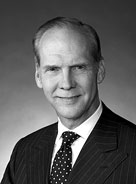
Craig Beale, FAIA, FACHA, RIBA, CHE, CHC
is HKS executive vice president and director
of the HKS Healthcare Group
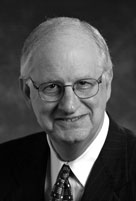
Ronald L. Skaggs, FAIA, FACHA, FHFI, is chairman
of HKS, Inc. and founder of the HKS Healthcare Practice
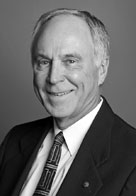
Joseph G. Sprague, FAIA, FACHA, FHFI, HKS
principal and senior vice president, is director of HKS Health
Facilities
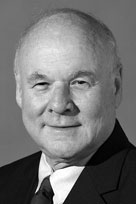
George J. Mann, professor of architecture,
was appointed as the Ronald L. Skaggs, FAIA and Joseph G.
Sprague, FAIA Endowed Chair in Health Facilities Design
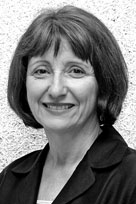
Susan Rodiek, professor of architecture
and associate director of Texas A&M’s Center for
Health Systems & Design, is holder of the Ronald L. Skaggs
Endowed Professorship in Health Facilities Design
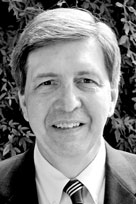
Roger Ulrich, professor of architecture,
is holder of the Julie and Craig Beale ’71 Endowed
Professorship in Health Facilities Design
|

